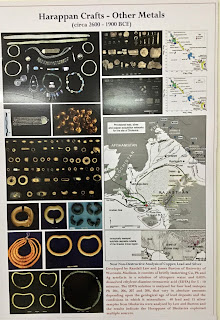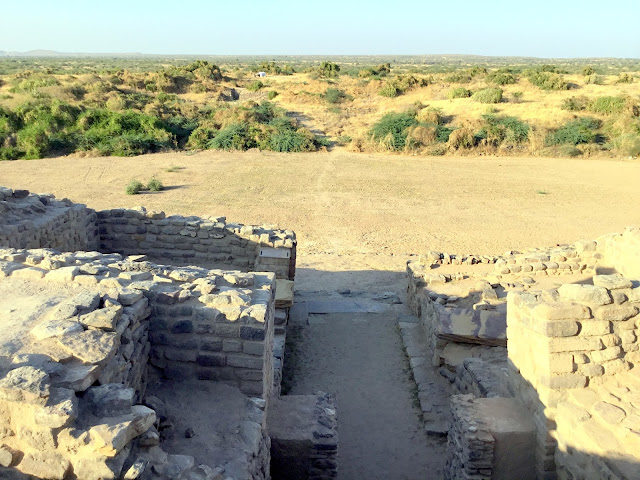We had planned to visit this Harappa site for the
last five years and eventually managed it in December 2017.
From Ahmedabad to
Dholavira it’s a very long drive so we halted at Wankaner which was a big
mistake. Our hotel Royal Oasis was terrible and we left early next day for
Dholavira.
Reaching there just around 1.30 pm, nearly five hours on the road in
the wintry hot sun.
You hit the White Rann about 15 kms from Dholavira
– it’s an awesome stretch of straight road built over what was water. As you
drive on this long stretch, there is endless waste land – all white glittering
in the heat.
It’s all salt.
We saw
many tourists stopped by the wayside taking photographs as it’s a unique experience.
As you see the water colour, you realise the different chemicals and salts in
its composition.
The Dholavira Tourism Resort where we stayed gives the appearance of being run by the Gujerat Govt. It is in fact run by the local sarpanch who is an affable man. He offers a full board with guided tour to the Harappan site, Sunset Point evening drive, Fossil Park etc as part of the stay package. There is a reduced rate for single accommodation. HOWEVER, the main issues are the quality of accommodation – we were put up in the Kutch style old round buildings where the stench from the bathroom gutters was AWFUL.


The rooms are basic, no furniture and bathrooms has tepid trickle of hot water. There is no room heater. There are a series of brand new AC tents which he has built but these were given to groups. The food is basic but plentiful. All vegetarian. Hygiene levels should not be looked at when staying here – the dining room has hay on the floor, less said about the kitchen the better. The staff however is warm hearted and helpful. There is a new resort which has come up before the BSF Camp so perhaps you should try that.

We were allotted a guide who was ignorant. We found
that the sarpanch has stopped all accredited guides and brought in his own men!
Luckily we had been recommended Jaymal
Makwana by a professional historian and heritage conservationist. We traced him
on the site and spent nearly two hours with Jaymalbhai learning
all about Dholavira’s ancient past. So if you are there, do ask for him. He knew
every angle having worked there from the very beginning under the guidance of
the first archaeologist.
I have published the actual sign boards from the
site as this gives accurate data.
There is a small museum with interesting
information and surprisingly well written explanations in English and Gujerati.
Good photographs. Decent lighting enabling you to read the captions!! 
The initial approach to the site appears difficult
for senior citizens. The climb to the top means climbing over large stones of
uneven surface and height. We found that there is a way around – go to the left
side and take a curving sloping route up the site. You may miss a section of
the site in the centre but you will see 90% of the site especially as the route
down is the same slope avoiding high stepping stones.


 The site is amazing. It is incredible to think of
what the culture achieved in those days – it’s a seven tier city in that there
are seven distinct stages. There is a
detailed schematic of the city. Houses with various rooms, a bathroom which
shows the water flow arrangement, the drainage system in place, the vast area
where there was an amphitheatre. We were
told that the actual dig is a small fraction of what is really there underground.
The site is amazing. It is incredible to think of
what the culture achieved in those days – it’s a seven tier city in that there
are seven distinct stages. There is a
detailed schematic of the city. Houses with various rooms, a bathroom which
shows the water flow arrangement, the drainage system in place, the vast area
where there was an amphitheatre. We were
told that the actual dig is a small fraction of what is really there underground. 



What was really fascinating was that the tourists come there from far parts of India. We were told that, apart from Gujerat tourists, they are generally from Bangalore, Chennai, Hyderabad, Kolkata and some from Mumbai. We met a group of youngsters who had driven down from Bangalore! I think that’s fantastic to see such a mixed group at such a far off place. Also important was that we saw no sight of any garbage – it was clean of any trash. Visitors did not shout into cell phones or call out to relations!! A remarkable sight in today’s constant Cellphone culture.

 Yes, the main negative was how the powers that be
behave. See the photos of the District Magistrate’s car – do you see the number
plate. Even that is acceptable.
Yes, the main negative was how the powers that be
behave. See the photos of the District Magistrate’s car – do you see the number
plate. Even that is acceptable.
What was annoying was the blatant disregard of
ASI Rules – the two cars were right up to the entrance area of the site which
is not allowed to anybody. True representation of Indian political might!!
We were just in time to catch the sunset at Sunset
Point which is about 10 kms from the Harappan site. Awesome view especially
with the island at one end and the sun at the other end of the camera frame. A fitting
end to a great but tiring day.

Text and photographs copyright of the author. No part of this article or photographs maybe transmitted or reproduced by any means, electronic, mechanical, photocopying or otherwise, without written permission. Do contact the author on email -- helpthesun@gmail.com






























No comments:
Post a Comment
Text and photographs are copyright of the author. No part of any article or photographs maybe transmitted or reproduced by any means, electronic, mechanical, photocopying or otherwise, without written permission. Do contact the author on email -- helpthesun@gmail.com